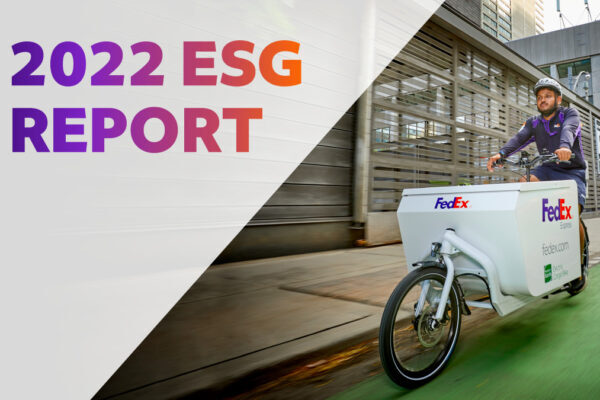
EU adopts new rules to significantly cut packaging waste with re-use targets
The European Union has formally adopted a regulation on packaging and packaging waste. The new ...

FedEx has released its 2022 ESG Report to highlight the achievements it realized to serve the sustainable development goals and confront the climate change.
The company plays an essential role in supporting communities and economies worldwide — a benefit that the company called “the FedEx Effect.” Each day FedEx connects millions of individuals, businesses, and communities around the world with opportunities in a responsible and resourceful manner.
The success of FedEx network is built on the company’s sound environmental, social, and governance (ESG) practices, which are outlined in this report in three sections focused on “our principles, our planet, and our people.”
“Our principles” reflect FedEx absolute commitment to ethics, integrity, and reliability in its business practices. These commitments also extend to its approach to its supply chain, policy advocacy, data, and cybersecurity.
Guided by the FedEx Code of Conduct and reporting channels, the FedEx governance structure is the bedrock of its continued success.
“Our planet” looks at the work underway to address the urgent challenges of climate change by implementing the company’s “Reduce, Replace, and Revolutionize” strategy across its operations.
The company continues to make progress toward its goal of achieving carbon neutral global operations by 2040, as announced last year. For example, despite continued business growth, as seen in FY21, it has reduced its emissions intensity by 45% over the last 12 years.
In April 2021, FedEx became the first North American transportation and logistics company to issue a sustainability bond, introducing a direct way for the investor community to support its carbon neutral operations goal.
The company is also working with strategic partners such as the Yale Center for Natural Carbon Capture and BrightDrop, a new business from General Motors. The firm knows this collaboration is key to identifying sustainable technologies that can be scaled for the benefit of both FedEx and the entire transportation industry.
“Our people” and their commitment to delivering the Purple Promise set us apart. The distinct FedEx culture is a differentiator, and the company is proud to have recently introduced a set of unifying, enterprise-wide culture values to knit our entire network of nearly 600,000 team members together under shared values and behaviors.
This evolution of the company’s culture builds upon its “People-Service-Profit” philosophy and Quality Driven Management system which help FedEx prepare for what’s next.
FedEx remains committed to compensating its team members fairly for their contributions and providing high-quality opportunities for growth.
To make FedEx even more attractive to prospective team members at all levels, it has expanded learning and development programs, DEI initiatives in the workplace and the communities it serves, flexible work environments, and investments in team member safety, including free COVID-19 testing and vaccinations for all U.S. team members.
Anchored by these three dimensions at the core of its business, FedEx will continue to innovate for its customers, create an environment where its team members can thrive, and work toward its ambitious goals to deliver for its customers and the planet.
Climate change FedEx understands the impacts climate change poses to its business, such as intensifying weather events, emerging GHG emissions regulations, increased media and investor attention, and enhanced customer demands to address environmental challenges.
While climate change poses strategic risks to the company’s business and stakeholders, it also presents opportunities as it advances its sustainability strategy.
FedEx also identifies and evaluates physical and transition climate-related risks through its ERM process and align its assessment and reporting approach with the recommendations from SASB and TCFD. This approach allows the company to manage its risks while evaluating its progress towards its sustainability-related goals.
To help achieve carbon neutral operations, the company has a goal to transition the entire FedEx parcel pickup and delivery (PUD) fleet to zero emission vehicles by 2040 through a phased approach. By 2025, we intend that 50% of FedEx Express PUD fleet purchases will be electric, increasing to 100% of all purchases by 2030.
It is accelerating its sustainable energy plan within its facilities worldwide through energy efficiency, renewable energy, and other energy management programs.
The company’s Energy SIT is focused on developing a strategy to achieve zero Scope 2 emissions by 2040, even though it anticipates that our facility electricity use will increase as FedEx transition to electric vehicles.
Its path toward carbon neutral operations also requires new strategies for removing and storing Earth’s excess carbon. In 2021, the company pledged $100 million to help establish the Yale Center for Natural Carbon Capture. This commitment encourages interdisciplinary research to create natural solutions for sequestering CO2 from the atmosphere. Development of these solutions falls into three major categories: biological, geological, and industrial. The Center’s initial target is to help offset GHG emissions equivalent.
FedEx is investing more than $2 billion over the next several years to support bold action in three key areas; vehicle electrification, sustainable energy, and carbon sequestration.
In addition, it continues to leverage other approaches to reduce vehicle emissions, such as increased intermodal rail usage at FedEx Ground and FedEx Freight, which avoided nearly 600,000 metric tons of carbon dioxide equivalent (CO2e) in FY21 alone.
Thanks to its ongoing collective emissions reduction efforts, FedEx decreased carbon dioxide (CO2) emissions intensity—on a revenue basis— by 45% from FY09 through FY21, a period when its average daily package volumes grew by 180%. Additionally, it is continuing to invest in initiatives such as the successful FedEx Fuel Sense program, aircraft fleet modernization, and alternative fuels to avoid aircraft emissions.
The European Union has formally adopted a regulation on packaging and packaging waste. The new ...
Inaugurating the Abydos Solar Power Plant in the Upper Egypt governorate of Aswan represents a ...
Businesses that fail to adapt to climate risks like extreme heat could lose up to ...


اترك تعليقا